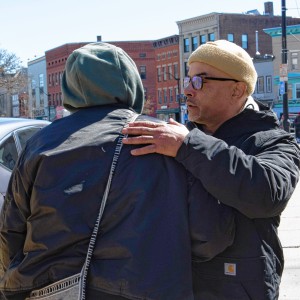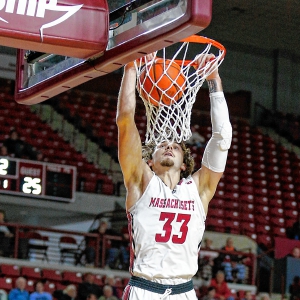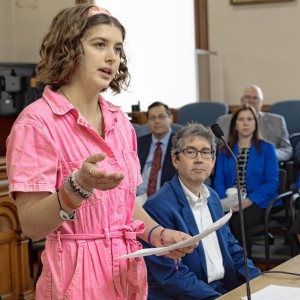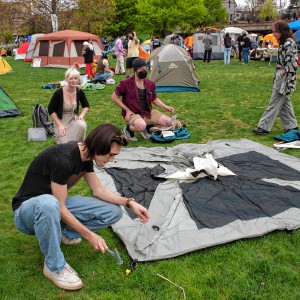Voting rights focus of annual Law Day for high schoolers across region
| Published: 05-04-2023 5:48 PM |
NORTHAMPTON — Students from five area high schools packed the historic county courthouse Thursday for Law Day events focused on the theme of voting rights.
Organized by the Northwestern district attorney’s office, the morning program included skits performed by students from Pioneer Valley Performing Arts Charter School and two speakers, University of Massachusetts political science professor Jesse Rhodes and Smith College women’s studies professor Carrie Baker.
In her introductory remarks, Deputy Northwestern District Attorney Veronice Santana quoted American Bar Association president Deborah Enix-Ross on Law Day, which was established by President Eisenhower in 1958:
“We face a country divided over many issues ... We have experienced decreasing faith in institutions and growing distrust of one another. We have seen attacks on the justice system, the norms of our democracy, and the rule of law. In this time of division, the legal profession must lead the way in promoting civics, civility, and collaboration.”
Two groups of five students from PVPA’s Mock Trial Team kicked things off with rapid-fire debates on convicted felons’ right to vote and mandatory voting.
Arguing that felons should be entitled to vote, Talia Villalobos-Sharone and Luke Laplante said that in stripping away the right to vote, society was engaging in the oppression of marginalized people.
Even incarcerated felons should be allowed to vote, like they are in Vermont and Maine, Laplante said.
In nine states, felons may lose the right to vote permanently. Most states allow felons to vote after release or after they complete probation.
Article continues after...
Yesterday's Most Read Articles
 A Waterfront revival: Two years after buying closed tavern, Holyoke couple set to open new event venue
A Waterfront revival: Two years after buying closed tavern, Holyoke couple set to open new event venue
 3-unit, 10-bed house in backyard called too much for Amherst historic district
3-unit, 10-bed house in backyard called too much for Amherst historic district
 Settling in on the streets: Six months on, Division of Community Care finding niche in Northampton
Settling in on the streets: Six months on, Division of Community Care finding niche in Northampton
 Valley writers shine in initial round of Mass Book Award competition: 12 area authors and author/illustrators long-listed for 2024 awards
Valley writers shine in initial round of Mass Book Award competition: 12 area authors and author/illustrators long-listed for 2024 awards
 UMass basketball: Matt Cross announces he’s transferring to SMU for final year of eligibility
UMass basketball: Matt Cross announces he’s transferring to SMU for final year of eligibility
 Democracy’s defense marches on: Constitutional lawyer, activist daughter highlight annual Law Day event
Democracy’s defense marches on: Constitutional lawyer, activist daughter highlight annual Law Day event
Presenting the opposing view, Serena Gross said there are all kinds of restrictions on voting, and the right to vote should be limited to those with sound judgment.
Those “actively working against the country should have no right to vote,” Eli Schalet said.
Laplante contended that convicted felons should at least be able to earn back their right to vote, while Schalet maintained that rehabilitation is sometimes impossible.
“Crime is indicative of a larger systemic issue,” Laplante responded.
In the second skit, Laplante and Charlotte Powell argued in favor of mandatory voting.
Powell said it’s important in a democracy to bring more voices to the table. A requirement to vote would boost voter turnout in the United States, which was around 60% in the last presidential election.
Fiona Yates suggested that people don’t vote because they don’t care, and that mandatory voting would result in more uninformed voters.
Laplante noted that more than 90% of the electorate voted in 2019 in Australia, which imposes a $20 fine for not voting.
“We need as many voters as possible,” he said.
Yates said there were better ways to increase turnout, such as making Election Day a national holiday.
“People need faith that their vote matters,” Eliza Tuthill said.
Grey Pouliot, who moderated both debates, thanked the speakers for their participation.
Along with students from Smith Academy, Amherst Regional High School, Smith Vocational and Agricultural High School and Hampshire Regional High School, the students ended their day with tours of the courthouse buildings, including a discussion with Judge John Agostini. Eligible students were also able to register to vote.
In his talk on why voting matters, Rhodes highlighted the fact that younger people are much less likely to vote than older people. Eighteen-to-29-year-olds are the most diverse generation in U.S. history, he said, and their political priorities — climate change, racial justice, reproductive rights — are different from older generations’.
With the young less likely to vote, he said, politics tends to focus on things that older people care about.
It’s not that young Americans are apathetic, Rhodes suggested, but there are obstacles to voting. Registering to vote and understanding how the system works are not simple.
He reminded the students that in Massachusetts they need to register at least 10 days before a vote, and he encouraged them to push for same-day registration.
With college looming, he said, maybe they can have an effect on problems like the high cost of housing.
“Get out there and do it,” Rhodes said, “otherwise old folks are gonna run the day like they usually do.”
In her presentation, Baker described voting as a conditional civil right, and enumerated the many stages in U.S. voting history leading up to the Voting Rights Act of 1965, which outlawed barriers to voting that were widely used, particularly in the South.
The voting age was lowered to 18 in 1971, but Baker said there has been a massive pushback on voting rights in recent years. The Supreme Court’s Shelby County v. Holder decision in 2013 has allowed voter suppression tactics to take root again across the nation.
“We are losing our rights,” Baker said. “They are coming for you.”
Young people are more likely to vote Democratic and support progressive causes, she said, and they are being targeted by voter suppression efforts such as bans on polling places on campus.
She urged the young people to get involved.
“If you can mobilize, you can swing elections,” she said.

 ‘We can just be who we are’: Thousands show support for LGBTQ community at Hampshire Pride
‘We can just be who we are’: Thousands show support for LGBTQ community at Hampshire Pride Doors open at Tilton Library’s temporary home at South Deerfield Congregational Church
Doors open at Tilton Library’s temporary home at South Deerfield Congregational Church Area property deed transfers, May 2
Area property deed transfers, May 2 Pro-Palestinian encampment disperses at UMass, but protests continue
Pro-Palestinian encampment disperses at UMass, but protests continue
